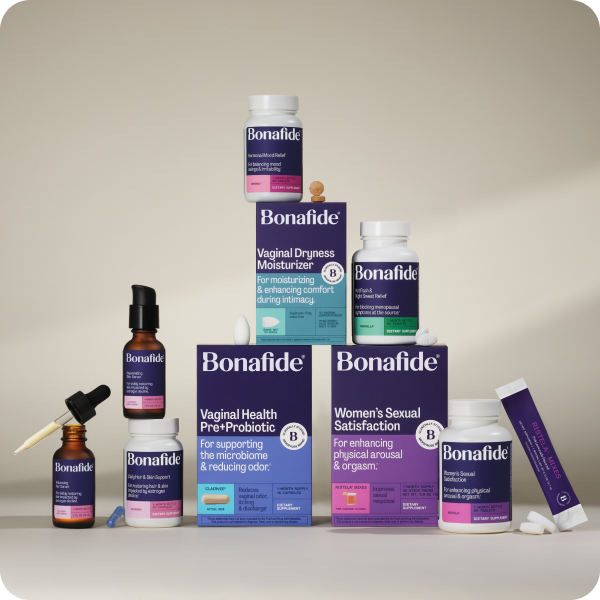In today’s world, it’s easy to feel overwhelmed by the sheer volume of information available online. A quick search for “menopause” on Google can leave you bombarded with ads on your Facebook or Instagram feed offering solutions, prescriptions, and cure-alls.
It’s only natural to wonder, “what do I really need to know about menopause?”
To help sort fact from fiction, we spoke with Dr. Alyssa Dweck, a Menopause Society Certified Practitioner (MSCP) and Chief Medical Officer at Bonafide. With years of experience and a passion for women’s health, Dr. Dweck is here to tackle the most frequently asked questions about menopause, address common misconceptions, and provide insight into what to know about the menopause transition.
What Sparked Your Interest in Becoming a Menopause Society Certified Practitioner (MSCP)?
“Historically, both medical school and OBGYN residency programs offer minimal training in menopause and midlife women’s health,” explains Dr. Dweck. “There’s such a heavy emphasis on pregnancy, labor and delivery, and surgical proficiency, that, menopause care—is not emphasized. Women spend more than a third of their lives in menopause; as my practice ages with me, a focus on menopause is essential.”
Ultimately, Dr. Dweck believes “certification is distinguishing and suggests a commitment to excellence in the space.” “Menopause care has become so nuanced—there’s no one-size-fits-all approach. Certified Menopause Practitioners demonstrate core competencies and expertise, positioning them to navigate the field with expertise, compassion and empathy.”
What is Menopause, Exactly?
“Menopause is defined as 12 consecutive months without menstruation after the age of 40, with no other underlying cause,” details Dr. Dweck. “It’s technically one day in time—a diagnosis made in hindsight. While some have pathologized it, menopause isn’t a disease. It’s a natural, universal life stage for anyone born with ovaries.”
Dr. Dweck emphasizes that menopause is not temporary or preventable. “It occurs when ovulation ceases, and the ovaries stop producing specific hormones like estrogen and progesterone. While the symptoms of menopause can vary, they are manageable.”
Is There a Test to Confirm Menopause?
“Menopause is a clinical diagnosis,” Dr. Dweck explains. “When someone has gone 12 consecutive months without a period, and there’s no other explanation, menopause has occurred. In some cases, blood hormone tests can support the diagnosis, but they aren’t always necessary.”
What Are Some Common Misconceptions About Menopause?
“Thankfully, there’s more conversation around menopause now than ever before, which is a positive step,” affirms Dr. Dweck. “However, myths and misinformation persist.”
- The definition of menopause: Many people think of menopause as a prolonged phase, but Dr. Dweck clarifies, “Menopause is one day in time. It’s the point when 12 months have passed without menstruation in someone over 40, without any other medical cause.”
- Everyone’s menopause journey is the same: “Symptoms can vary greatly due to genetics, ethnicity, and lifestyle,” she says. For example, data from the SWAN study suggests Black and Hispanic women often experience more intense hot flashes and night sweats compared to White and Asian women.1
- Hormone therapy is the only option: “While hormone therapy is very effective, there are alternatives, including hormone-free and non-drug options,” notes Dr. Dweck. “It’s about finding safe effective tools, backed by research combined with shared decision making.”
To further explore these points and hear more from Dr. Dweck's, check out this recent video interview where she delves into these menopause misconceptions and more.
Dr. Alyssa Dweck shares common misconceptions and more about menopause in a recent local ABC news clip, here.
How Does the Menopause Experience Vary?
Dr. Dweck highlights findings from the SWAN study, an ongoing multi-center research project on women’s health across the lifespan. “Genetics play a significant role—your mother’s experience can be a predictor of yours. Ethnicity also influences symptoms, and lifestyle habits, like smoking, can worsen them.”
Beyond these factors, recent advancements in menopause care focus on innovative ways to address common symptoms.
Final Thoughts: What Do I Need to Know About Menopause?
Menopause is a natural, inevitable transition—but it doesn’t have to feel overwhelming or isolating. As Dr. Dweck explains, “Every woman’s journey is unique. Finding trusted, evidence-based information is key to managing this stage of life.”
By addressing common questions about menopause and clearing up misconceptions and misinformation, we hope to empower more women to approach menopause with confidence. The earlier you start asking questions, the more prepared you’ll be when this life stage arrives.
Resources
1. https://www.uchicagomedicine.org/forefront/womens-health-articles/hormone-therapy-research-race-menopause








